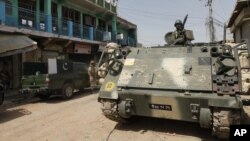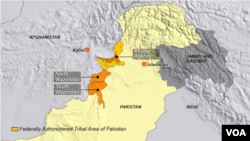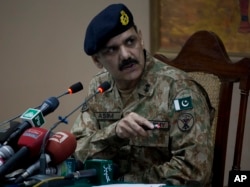Ahead of a new round of Afghan peace talks, Pakistan is reporting progress in pacifying the Taliban strongholds that have been at the center of long-running tensions with Kabul.
Pakistan army spokesman, Lt. General Asim Bajwa, said that its Zarb-e-Azb anti-terrorism operation launched 18 months ago has helped secure the volatile semi-autonomous North Waziristan border region and eased concerns of neighboring Afghanistan.
Bajwa said that some 3,400 militants have killed in fighting, while the Pakistan army also has lost nearly 500 security personnel in the ongoing ground and air offensive.
Wazirstan district cleared
He told VOA that except for “a couple of pockets” the entire Waziristan district has been cleared of insurgents. He said the troops have only recently established control over the strategically located Shawal valley, protected by thick forests and treacherous mountains, where Afghan Taliban and other foreign militants have had their strongholds.
“We just completed clearing Shawal valley also. We are sitting on the mountaintops overlooking Shawal already. But there a couple of pockets just northwest of Shawal and we are right now busy there,” said Bajwa.
The army’s claims of progress are difficult to verify because journalists have long been barred from the area. But the North Waziristan tribal region for years has been considered a hub of Taliban insurgents and al Qaida linked militants who have been targeted by U.S. drone strikes.
Infiltration into Afghanistan
Afghan authorities allege that a large number of local and foreign militants fleeing the Pakistani onslaught have crossed into Afghanistan and joined hands with the Taliban and other extremist groups to intensify insurgent violence on their side of the border.
Some skeptics say that the Pakistan military waited too long before launching the Waziristan offensive, allowing militants to flee their hideouts.
Speaking at a regional conference in Islamabad last week, Afghan President Ashraf Ghani described the infiltration into Afghanistan as an “unintended consequence” of the army operation.
Bajwa acknowledged there are some militants who fled across the Afghan frontier but he blames the porous border dividing Pakistan and Afghanistan.
“It is a very long border, around 2,600 kilometers and it is humanly impossible to block the entire border. I think there is a lot of deliberation which gone in and we have prepared a border management Standing Operating Procedures and we have shared the document with Afghanistan. I think once it comes into force there will be a lot of improvement on ground, and with better management, better coordination things will improve considerably,” stated Bajwa.
Pakistan's offensive
General Bajwa said Pakistan’s successes in the so-called Zarb-e-Azb offensive paved the ground for resuming bilateral contacts between Islamabad and Kabul.
When President Ghani visited Islamabad last week, he held extensive discussions with Pakistani, American and Chinese representatives on efforts to end violence and resume the stalled Afghan peace dialogue.
Senior Pakistani officials requesting anonymity told VOA discussions involving all stakeholders are currently underway to finalize a date and venue for the new round of peace talks between the Afghan government and the Taliban.
They said Pakistani military Chief General Raheel Sharif is due to visit Kabul in the coming days to firm up those details. That trip, officials said, will also mark the formal resumption of military-to-military and intelligence contacts between Pakistan and Afghanistan.


